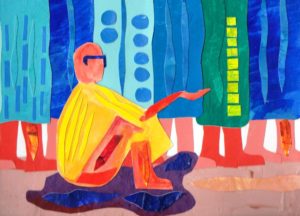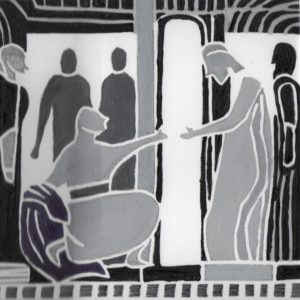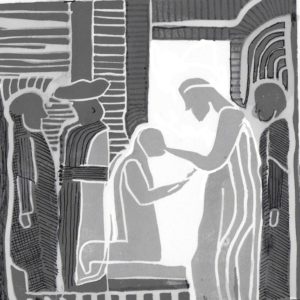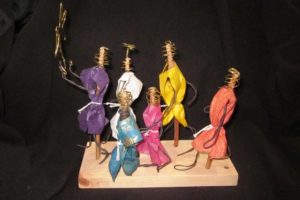The early morning sky was dark, but for him the sky was always dark. He rose, washed sleep from his sightless eyes, threw his cloak over his shoulder, and grabbed his cane. As he passed his old mother’s room, he thanked God for her and said a silent prayer of blessing, “May the Most Merciful One have mercy on us today.” Then he slipped out the door and headed for the Old City Gate, tapping as he went.
Tap, tap, tap past homes of his neighbors still sound to sleep. Tap, tap, tap past the tailor shop his deceased father once owned, long since abandoned when Bartimaeus lost his sight. Tap, tap, tap past the Synagogue where he prayed daily. Tap, tap, tap to the city gate.
Holy week was two days away. Pilgrims heading south from the Jordan Valley passed through Jericho on their way to Jerusalem to celebrate the Passover. Most would want to get an early start in order to make it to their destination before nightfall. They faced a seventeen mile uphill climb through the Judean Hills and no one wanted to be stuck on a bandit infested road in the dark. In the dark one is vulnerable. In the dark one is at a disadvantage. In the dark one is at the mercy of both bad and good.
Bartimaeus found his usual spot outside the Old City Gate on the main road between Old Jericho and New Jericho. He removed his coat and laid it in the dust beside the road. He then sat down on top of the coat. His coat created the physical space where he could carry out his business—the begging business. His coat was his shop where passersby would throw coins, leave food, or offer cups of water. His coat defined the space between himself and the other beggars who were soon to arrive—the lame, the sick, the blind, the forgotten lined up on the main street of misery; lined up and waiting for someone to show them mercy.
The light of dawn turned black sky to grey. He heard birds chirping. He heard the voices of pilgrims stirring in their camps. He smelled the smoke from their fires. And he waited. He had come to realize that waiting, not begging, was his primary occupation. As a sightless man, there was little he could do to control his destiny. He was dependent upon the good will of others. In the early years of his blindness, he resented the feeling of helpless dependency. He wanted to be whole again. He wanted to provide well for his family. He wanted the respect given to every other able bodied man. But in place of respect he encountered pity, dismissal, and even derision.
Lately though, something had changed. After years of wrestling with feelings of bitterness, anger, and helplessness; after struggling with the desire for life to return to the way it once was, he let go. He let go of his past and embraced his blindness. He reluctantly accepted his limits and tried to do the best he could with what he had. In those moments of letting go, embracing, and accepting, he sensed an internal darkness slowly begin to recede. He sensed for the first time in many years that he was not alone. He was not sure who or what was with him but he could tell the presence was benevolent. He could tell he belonged to that presence and the presence belonged to him. At a gut level he knew he was going to be OK. He was not sure how or why he knew what he knew, he just knew it. That knowledge gave him comfort as he sat on his coat waiting.
Bartimaeus sensed someone approaching. Then he heard footsteps—two or three people. “Mommy, why is that man sitting there? Mommy what’s wrong with his eyes?” It was always children who saw him first. It was as if they were the only ones who could truly see. Adults instinctively looked away. They did not want to see what they could easily become if fickle fortune turned against them.
“Daughter, give him this piece of bread. Put in on his coat but don’t touch him. He might be dirty,” the mother whispered. The daughter placed the bread on the coat and Bartimaeus could sense her looking intently at him—eyes filled with wonder. “Bless you my child, he whispered to her.” And then a little louder so her parents could hear, “May the Lord protect you this day as you travel to the Holy City! Shalom.”
“Shalom to you,” the father said as their footsteps faded away to the south. Bartimaeus took the bread and gave thanks. He was hungry. If he was given coins or fruit later in the day, he would save that for his mother, but bread would go stale, so he ate. And he waited. He was always waiting but today he sensed at a deeper level that something was going to happen. He didn’t know what that might be or why he knew what he knew. He just sensed that some part of his being was more alert than normal. Some part of him was feeling more animated and expectant. He liked the feeling.
As the sun rose in the east, he could feel the rays warm the left side of his face. In the distance he heard dogs barking and the voices of pilgrims breaking camp and gathering their children. The sound of footsteps increased and with it the smell of dust in his nostrils as people silently walked past him in the early morning light. He called out, “May the Lord bless and protect you this day.” The pilgrims continued to walk in silence. He continued to wait.
In the distance he could hear a larger group of people singing and laughing. As they drew closer, the cloud of dust they created washed over him. The cacophony of voices and footsteps and clanging pots and pans and dogs barking increased. Someone standing nearby on the roadside said to the person next to him, “Look, there he is, the one in the middle!” His companion replied, “Is that the miracle worker from Nazareth we heard about?”
“Yes, they call him Jesus. But now that I see him up close, he doesn’t look all that impressive. I guess I was expecting someone different.”
Suddenly, something inside Bartimaeus exploded. In that deep place of knowing and belonging he saw the one to whom he belonged. He saw the merciful one who sustained him daily. And he understood with every fiber of his being that Jesus from the backwoods of Nazareth was more. He was more than an itinerant miracle worker. He was more than a celebrity. He was more than the crowd of revelers knew or expected. He was none other than the crown prince returning from exile to claim the royal throne of his father David. He was the long expected king. Without even knowing it, Bartimaeus heard his lips scream, “Jesus son of David, have mercy on me! Jesus, son of David, have mercy on me!!”
Those gathered near him said, “Bartimaeus, shut up! You are making a scene.” But Bartimaeus screamed louder, “Jesus, son of David, have mercy on me!”
Others in the crowd shushed him saying, “Shut the beggar man up. We have a long hike ahead of us and we need to keep moving.” Another said, “Keep the sinner silent, his voice doesn’t count.”
“Jesus, son of David, have mercy on me!” Bartimaeus then quietly prayed, “Yahweh, please hear my voice!” Instantly the crowd stopped. Jesus raised his hand and voices fell silent. “I hear someone calling my name. Who is it?”
Jacob, a lame man sitting near Bartimaeus said, “Bartimaeus, he is calling for you. Go!” Bartimaeus grabbed his cane in his left hand and his coat in his right and jumped up. He began to take a step towards the voice of Jesus when he realized, “I don’t need these any longer.” On impulse, he cast them aside and extended his empty hands in front of him as he groped his way forward. Then strong hands reached out, grabbed his, and pulled him closer. A calm voice then spoke quietly in his ear, Son of Timaeus, I heard you and you saw me. What do you want me to do for you?”
“My Rabbi, I want to see. I want to see you.” In that next moment, Bartimaeus felt fingers gently touch his eyes as he heard the voice of Jesus say, “Go, for your faith in me and my father has healed you.”
Instantly an explosion of light flooded his brain dispersing the darkness. Night was over. Dawn had come. And as he stood in the light of day, the first thing he saw was the face of Jesus. He was more beautiful than Bartimaeus could ever have imagined. When he looked into his eyes, he saw the reflection of his own eyes looking back and he understood. “Lord, I sensed you in the darkness with me. Now I see you in the light.”
Bartimaeus fell to his knees and began saying over and over again, “Thank You, Praise be to Yahweh! Thank you! Praise be to Yahweh!”
Someone in the crowd shouted, “Blind beggar man can see!” Praise Yahweh!” Others joined in shouting “Praise Yahweh! Praise Yahweh!” Soon the whole crowd was chanting “Praise Yahweh! Praise Yahweh”
Jesus grabbed Bartimaeus by the shoulders and helped him up. Then as the crowd resumed their walk towards Jerusalem, amidst chants, singing, and clanging pots and pans, Jesus pulled Bartimaeus closer to him and said in his ear, “Son of Timaeus, in the same way that you discovered me in the dark, help others to do the same.” The crowd then slowly made its way up the hill in a cloud of dust.
Later that day Bartimaeus returned and made his way to his usual spot beside the Old City Gate. He found his friend Jacob sitting alone.
“Jacob, I can see,” he said.
Jacob replied, “Actually, I think you could see before when you were blind. But now you can see even better. Help me up, I think we have work to do.” And off they hobbled arm in arm.
Bartimaeus Artwork: by Steven Stuckey 2016
© Steven A. Stuckey 2016




